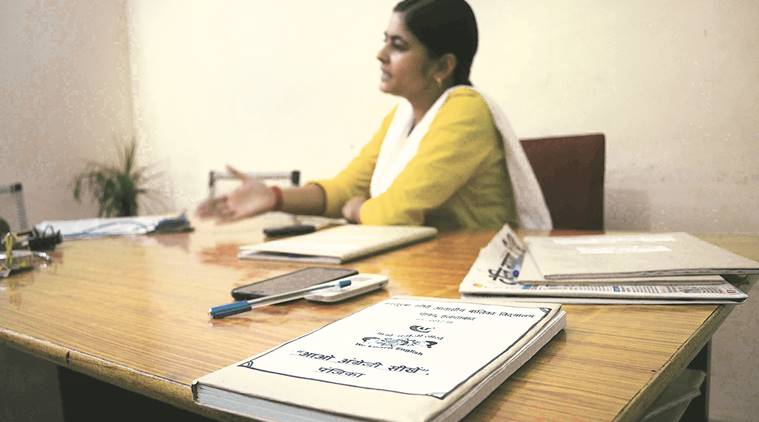Stay updated with the latest - Click here to follow us on Instagram
A day in the life of Class 6, Kasturba Gandhi Balika Vidyalaya, Chaka, Allahabad, learning English over radio: ‘This way you will slowly, slowly learn English’
15-minute broadcast, every alternate day, for 7 months — a school hopes that will bridge the language gap
 Class 6 struggles to hear the broadcast as the signal remains poor. Ritesh Shukla
Class 6 struggles to hear the broadcast as the signal remains poor. Ritesh Shukla
Around 9.30 am, post the 30-minute assembly, students of Class 6 take their places in a ground-floor classroom in Kasturba Gandhi Balika Vidyalaya (KGBV) residential school in block Chaka of Allahabad district. The students are just back from a month-long summer vacation, but there is another reason why it is taking longer than usual for the class of 25 to settle down and the whispers to die. Few pay attention as Pratima Singh, a science teacher who is filling in for the absent English teacher, writes out the first lesson for the day on the blackboard. ‘What is your name?’, she scrawls.
The buzz in the class is about what is to follow: a lesson in spoken English over the radio. This is the second such class for them under the state government’s Aao Angrezi Seekhein programme. The inaugural lesson was held on July 17 in the presence of district officials and local media. Around 10.30 am, Singh steps out to talk to Anita Devi. The school principal is on leave and Devi, who teaches social sciences, is the temporary in-charge. After a brief chat, Singh heads to the staff room and brings two small radio sets, while a student fetches a wireless speaker and microphone from the adjacent room.
The Uttar Pradesh government has chosen Kasturba Gandhi Balika Vidyalayas (KGBVs), among other schools, to deliver spoken-English tutorials on All India Radio, a project that’s being run in association with the UNICEF. Covered under the Sarva Shiksha Abhiyan, the lessons are to be held for sixth graders at an estimated 746 KGBVs and 47,400 upper primary schools across the state, every alternate day, for seven months, adding up to 100 radio lessons.
Mahendra Dutt Pandey, the Chaka Block Education Officer, says the lessons are meant to make learning English easier and fun. “English lessons taught from books are difficult for children to learn. But these oral lessons will make it easier and more interactive for them, especially because no one in the students’ homes or their surroundings converses in English. We were offered help by the UN and we took it,” Pandey says.
KGBVs are residential schools, each with a maximum hundred girls, between Classes 6 and 8. These were set up a decade ago by the Centre for girls who had dropped out of school. “The 92 students studying here come from very backward families. Their parents are too poor to afford educating them and most prefer to keep them at home for household chores or to look after siblings,” says Devi.
KGBV teachers, such as Devi, 28, and Singh, 27, visit villages falling in their respective blocks to get the girls back into the school system. Convincing the parents isn’t always easy, says Devi. “Of the 20 seats reserved for Muslim girls, eight are vacant because their families were not okay with their daughters staying in a hostel.”
The girls in Class 6, between the ages of 11 and 14, are currently undergoing a sixth-month “bridge course” to catch up with the grade as some among them have had a long gap since they were last in school.
Dressed in maroon salwar-suits, they sit in a brightly coloured room decorated with cutouts of trees and flowers, and charts depicting the solar system, the monsoon and the national symbols.
All eyes are on Anita Devi, who is trying to catch the AIR station that will broadcast the English tutorial. She cocks her ears, squints at the ceiling, all the while adjusting the frequency dial. Meanwhile, Singh and Pinki, who is the arts and craft teacher, fidget with the other radio set.
Finally, Devi carries the radio outside the room to try get the station. “Signal is really weak here,” she says frustrated, walking back in. From both radio sets voices emerge in weak spurts, almost drowned out by the static. Singh tries another idea. “Fan band kar do (Switch the fan off),” she bellows.
A student obliges, and no one complains as the still, humid air leaves the class in sweat. Thankfully, after a few minutes, just in time for the English tutorial to start, the voices from the radio start taking a discernible form.
A man is heard asking, “How many brothers and sisters do you have?” A woman replies, “I have two brothers and no sisters.” A child’s voice interjects in Hindi, “Matlab apke koi bhai-behen nahin hain (Meaning, you have no brothers or sisters)?” The woman corrects, “Mere do bhai hain aur koi behen nahin hai.”
A musical interlude follows, and then a woman’s voice instructs teachers to get the children to repeat after her the questions she asks. “Is tarah, aap aaste-aaste angrezi seekh jayenge (This way, you will slowly, slowly learn English),” says the voice.
Singh leads, asking the class to repeat after her questions ranging from parents’ names to how many siblings one has. “How many sister (sic) do you have?” she intones slowly at one point, and answers herself. The class repeats after her in a sing-song drawl.
The teachers then instruct Nancy, one of the students, to ask classmate Shivani what her mother’s name is in English. Shivani replies correctly. Singh says a loud “good”. One by one, all the 20 students are made to do this. Many falter, forgetting to say ‘What is’ before ‘your’ in the question, or say their names when asked their parents’. They are gently corrected.
The whole lesson, along with the 15-minute radio broadcast, lasts half an hour. Students are then told to deposit the radio sets back in the staff room cupboard.
Teachers say the two Philips devices were provided by the state government. Before the English lessons began, the radio sets were used only once last year, to broadcast Meena Ki Duniya, a radio programme that teaches girls their rights and the importance of education.
Singh, who graduated in zoology from Allahabad University and is preparing for the civil services, says, “Each English broadcast will be linked to the previous one. If we miss a single class, it will break the sequence of learning. These children are particularly weak because they are lagging behind.”
 nita Devi, temporary in-charge of the school, says English is a big deal. Ritesh Shukla
nita Devi, temporary in-charge of the school, says English is a big deal. Ritesh Shukla
Meanwhile, the Class 6 students have moved on to maths. They will have two more classes before lunch at 12.30 pm. A few students from Class 8 are called to the kitchen to help make chappatis since two of the three cooks have not turned up. Around 300 chappatis are to be served, in batches of 25, to the students gathered in the dining room. Besides, there is boondi-raita, chaawal and aloo ki sabzi today, with Singh and Devi supervising.
Apart from cooks, the school is always struggling with absent teachers. Of its seven teachers, three are present today. The English teacher has not been coming since November. Full-time teachers like Anita and Singh live on the campus and are paid Rs 20,000 a month, besides getting food and bedding. Part-timers get a little more but don’t get accommodation.
The teachers say they plan to record the English radio lessons and play them for Classes 7 and 8 too. “English medium-Hindi medium is a big maamla (issue) here. Parents increasingly opt for private schools during admission season. These English tutorials will be a big draw,” says Devi, a BHU graduate who plans to take competitive exams for the job of a middle-school teacher.
However, Poonam Bhatia, a student of Class 8, isn’t too convinced. Her parents work as labourers in a brick kiln, and she is candid that if she could, she would go to a private school. “English is required for everything,” says the 15-year-old.
Over at the school office, a few students have dropped by from the nearby government-run residential Samajwadi Abhinav Vidyalaya to ask about documents needed to get siblings admitted to the KGBV. Among them is Class 9 student Manisha Patel, who studied in the KGBV till a year ago. She says the KGBV taught her how to read and write English but that she struggles to understand verbal English or speak the language.
“I had dropped out of school in Class 5 as my father fell ill and I had to work in farms. Three years later, I took up studies again at this school, and it ensured we were admitted to Class 9 in nearby schools. But I am finding it very difficult to keep up because the teacher speaks in English,” says Manisha. The 15-year-old, whose parents work as farm labourers, earning around Rs 4,000 a month, cannot afford tuitions.
“English nahin aata hai matlab knowledge mein zero (Not knowing English means you are no better than zero),” Manisha adds. “Because we do not know English we will never be able to learn anything. Higher studies and competitive exams also require English. This is the end of the road for me. I will have to drop studies again after Class 12.”







